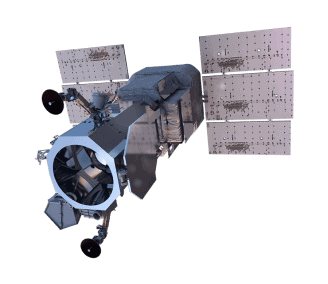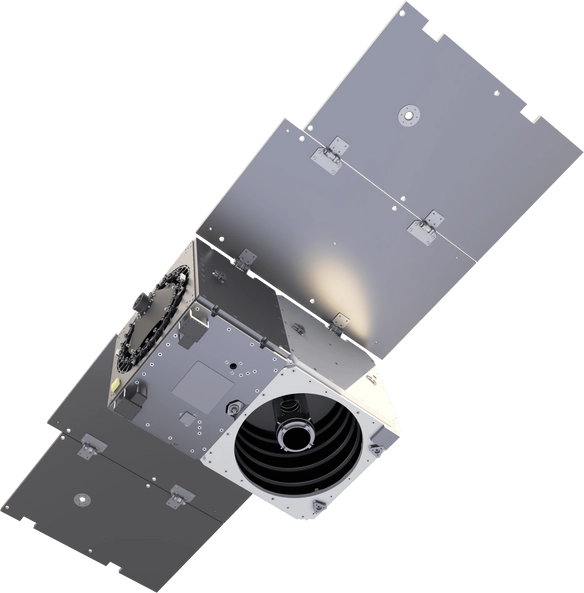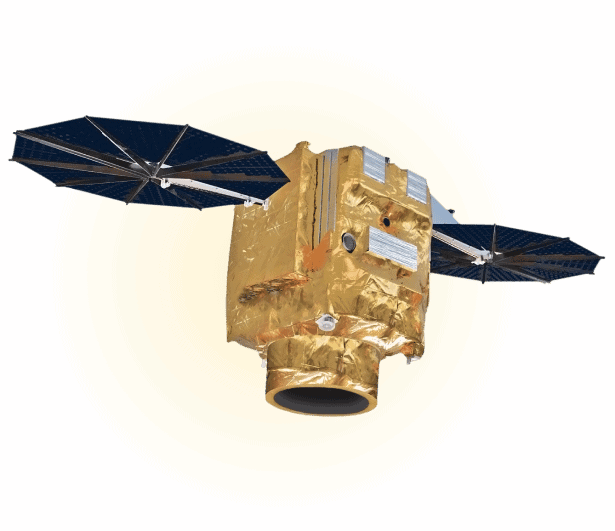
WorldView-3
WorldView-3 is the industry’s first multi-payload, super-spectral, high-resolution commercial satellite. Operating at an altitude of 617 km, WorldView-3 provides 31 cm panchromatic resolution, 1.24 m multispectral resolution, 3.7 m short-wave infrared resolution, and 30 m CAVIS resolution. WorldView-3 has an average revisit time of less than one day and is capable of collecting up to 680,000 sq km per day, further enhancing the Maxar collection capacity for more rapid and reliable collection.
Very High Resolution
Panchromatic 31 cm
Visible & near-infrared 1.24 m
Short-wave infrared 3.7 m
CAVIS 30 m
Rapid retargeting using Control Moment Gyros

WorldView-3 Specs

Launch Information
Date: September 18, 2007
Launch Vehicle: Delta 7920 (9 strap-ons)
Launch Site: Vandenberg Air Force Base, California
Orbit
Altitude: 617 km
Type: Sun synchronous, 10:30 am descending node
Period: 97 min
Spacecraft Size, Mass and Power
Size: 5.7 m (18.7 ft) tallx2.5 m (8 ft) across
7.1 m (23 ft) across deployed solar arrays
Mass: 2800 kg (6200 lbs)
Power: 3.1 kW solar array, 100 Ahr battery
Sensor Bands
Panchromatic: 450–800 nm
8 Multispectral: 397-1039 nm
8 SWIR Bands: 1184-2373 nm
12 CAVIS Bands: 405-2245 nm
Sensor Resolution
Panchromatic nadir: 0.31 m
20 degrees off-nadir: 0.34 m
Multispectral nadir: 1.24 m
20 degrees off-nadir: 1.38 m
SWIR nadir: 3.70 m
20 degrees off-nadir: 4.10 m
CAVIS nadir: 30.00 m
Dynamic Range
11-bits per pixel pan and MS; 14-bits per pixel SWIR
Swath Width
At nadir: 13.1 km
Attitude Determination & Control
Type: 3-axis Stabilized
Actuators: Control Moment Gyros (CMGs)
Sensors: Star trackers, precision IRU, GPS
Pointing Accuracy & Knowledge
Accuracy: <500 m at image start/stop
Knowledge: Supports geolocation accuracy below
Retargeting Agility
Time to slew 200 km: 12 sec
Onboard Storage
2199 GB solid state with EDAC
Communications
Image & ancillary data: 800 and 1200 mbps X-band
Housekeeping: 4, 16, 32, or 64 kbps real time, 524 kbps stored, X-band
Command: 2 or 64 kbps S-band
Max Contiguous Area Collected in a Single Pass (30° off-nadir)
Mono: 66.5 kmx112 km (5 strips)
Stereo: 26.6 kmx112 km (2 pairs)
Revisit Frequency (at 40°N Latitude)
1 m GSD: <1.0 day
4.5 days at 20 degrees off-nadir or less
Geolocation
Accuracy (CE90)
Predicted <3.5 m CE90 without ground control
Capacity
680,000 sq km per day
Unsure if
WorldView-3 is right
for your project?
You shouldn’t have to be an expert in high-resolution satellite imagery to find what you need.
Our team is dedicated to making the process easy for you. All you have to do is tell us the problem. We find the answers from a vendor-agnostic perspective and present you with clear, simple solutions.
Tell us the problem
Explain the situation to us on your terms. We’ll translate it into the world of Satellite Imagery.
Review Your Options
Be presented with a simple choice of the top 2-3 imagery solutions for your project.
Make confident decisions
Know you have the right data in hand to make the critical decisions that keep your project moving forward.
Other Satellites
When we need high-resolution satellite imagery, we trust Pacgeo for their quality imagery and reliable turnaround times.
David Bluestone
Vice President of Exploration, Bluestone Resources
Ordering high-res satellite imagery through a partner agency order desk was always painful and fraught with multiple issues. Dealing directly with Pacgeo allows me to bypass the aforementioned issues, while getting quick and reliable access to the data I need.
Government Employee
Government of Canada




